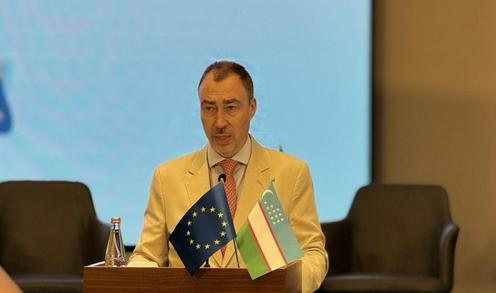The European Union has launched five new projects in Uzbekistan to support civil society organizations across the country. Nearly €2.9 million has been allocated for their implementation, according to a press release from the EU Delegation to Uzbekistan. The initiatives were officially presented on April 28 in Tashkent.
These joint EU projects are designed to reinforce Uzbekistan’s ongoing reform agenda by strengthening civil society’s role in political dialogue, gender equality, legal education, media literacy, and digital rights.
The following projects have been launched:
✅ EQUALITY — Aimed at strengthening civil society in protecting women’s rights and empowering them. Led by ACTED (Agency for Technical Cooperation and Development) in partnership with the “White Sail” Center for Social Protection and Education, the Yuksalish Information and Consulting Resource Center in Kashkadarya, and the NGO Center NIHOL.
✅ SHIELD — Focused on advancing human rights, education, and legal development. Implemented by the International Commission of Jurists (ICJ) in cooperation with the Center for Development Strategy.
✅ Human Rights in Action — Promoting change with youth and NGOs. Run by Deutscher Volkshochschul-Verband e.V. (DVV, German Adult Education Association) in partnership with the Barkaror Hayot International Socio-Educational Center.
✅ Uzbekistan Digital Rights and Media Initiative (UDRMI) — Implemented by the Center for the Development of Modern Journalism in collaboration with the Legal Policy Research Center (Kazakhstan).
✅ Empowering Civil Society for Inclusive Development in Uzbekistan — Coordinated by the Konrad Adenauer Foundation (KAS) in cooperation with the Yuksalish movement.
EU Ambassador to Uzbekistan Toivo Klaar highlighted the success of the recent EU–Central Asia Summit and said the launch of these projects reflects the EU’s steadfast support for civil society in the region. According to Klaar, the aim is to enable citizens to play an active role in justice, gender equality, and digital and informational rights.
“An active civil society is essential for building a democratic, inclusive, and prosperous future, and the EU is proud to be a reliable partner on that path,” the ambassador stated.
Akmal Saidov, Director of Uzbekistan’s National Center for Human Rights, emphasized that strengthening civil society is becoming a key component of building a just and inclusive society under the country’s Strategy 2030.
“These EU-supported projects mark an important step toward deepening Central Asia–Europe cooperation, empowering civic activists, and advancing rights-based development,” he said.
The initiatives will be rolled out in Tashkent, Karakalpakstan, Namangan, Samarkand, Kashkadarya, Surkhandarya, and other regions. They aim to build the capacity of activists, support vulnerable groups, and foster collaboration between civil society and state institutions at all levels.










